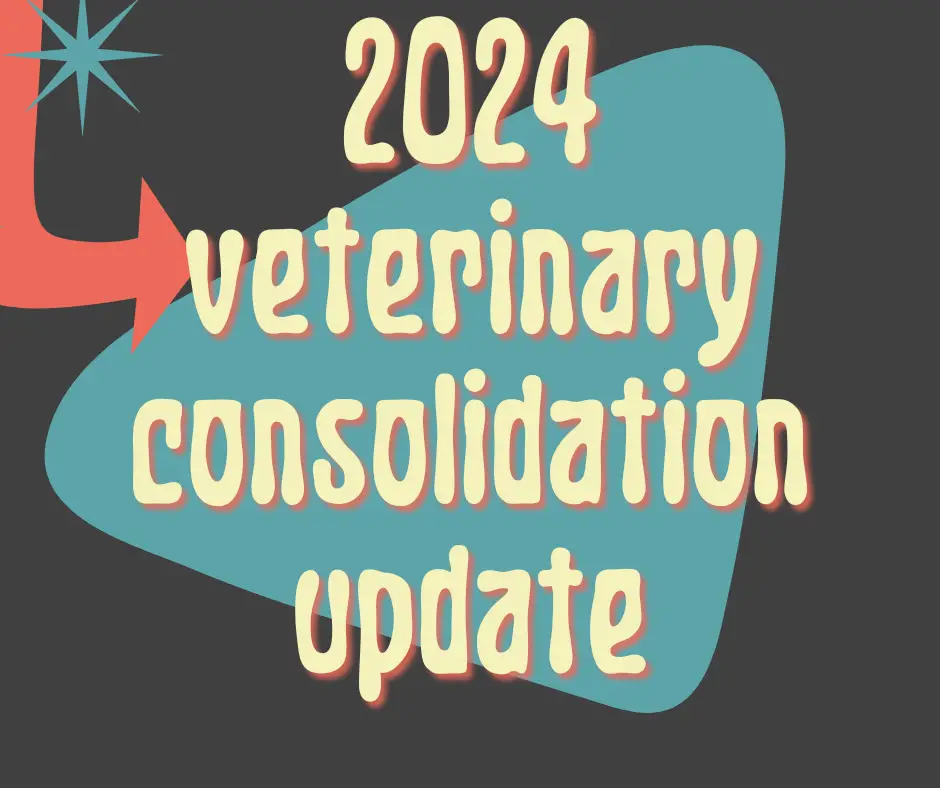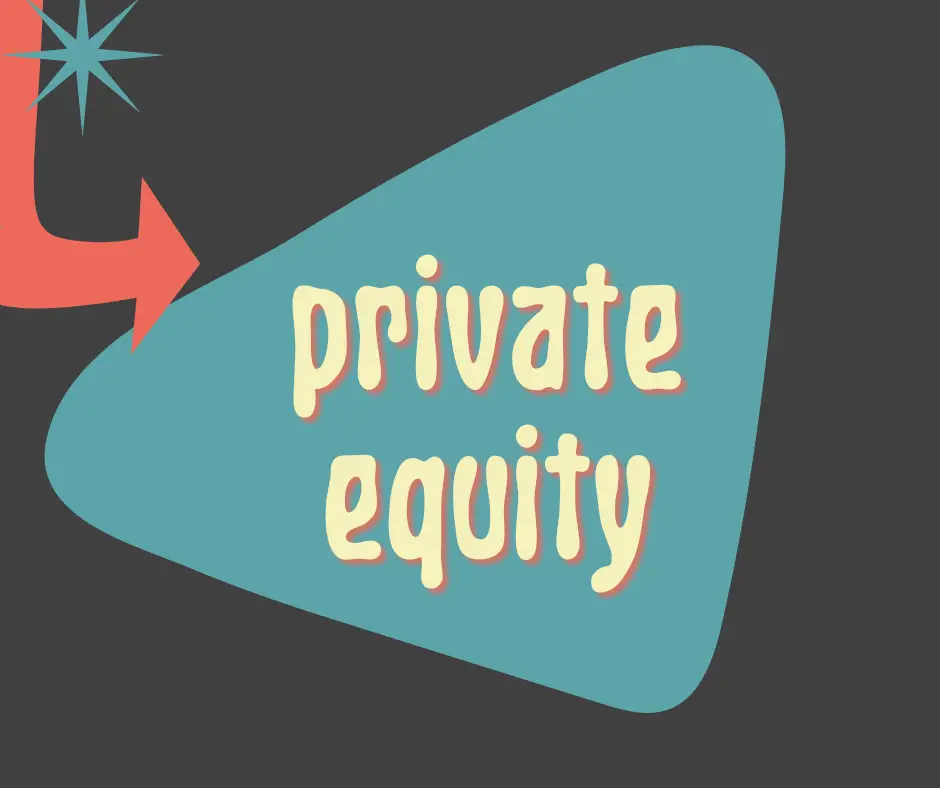2024 Veterinary Consolidation Update

Here’s my 2024 veterinary consolidation update as I continue to worry about the kind of veterinary care options available to people like us in the future. The veterinary magazine article I wrote won’t publish until June 2024, but I want to share some relevant info with you from my research for that piece. Despite some stats that make my stomach hurt, industry experts I interviewed promise me that it’s going to be OK. Let’s look at what I learned and how experts answer questions about things like private equity’s role in veterinary medicine.
2024 Veterinary Consolidation Stats
People often say that currently big veterinary consolidators and corporations own 80% of specialty veterinary hospitals and 30% of general practice veterinary hospitals. However, one of the veterinary industry experts I interviewed told me that 2024 will see the crossing of the 50% veterinary consolidation threshold for your typical general, specialty, and emergency practices.
He clarified, however, that this stat excludes smaller, 1-doctor hospitals, vax-only or spay/neuter-only clinics because big companies and investors won’t buy them.
Veterinary Consolidation Bubble
For several years overlapping the pandemic, veterinary consolidators bought veterinary hospitals in droves. They paid more and more money for more and more practices (as small as barely 2-doctor practices). They saw a cash cow and wanted into the industry. Several factors drove this veterinary consolidation bubble:
- Banks made money practically FREE to borrow.
- Private equity got involved, bringing tons of $$.
- Pet consumer demand for veterinary care rose sharply during the pandemic.
- Many retirement-age veterinary owners took the opportunity to sell.
- Many younger veterinary owners wanted to sell because it got harder and harder to run a veterinary hospital.
Around December 2022, though, things changed. Interest rates went up. Demand for veterinary care returned to normal. Veterinary professionals fled the workplace due to stress and frustration. New buyers and investors with ZERO knowledge of veterinary medicine found out just how hard the business truly is, especially with struggles filling open jobs. Goodbye bubble.
Veterinary Consolidation Slow Down
Veterinary consolidation slowed considerably at that point.
- The big guys got pickier about what veterinary hospitals to buy.
- They greatly lowered how much they’re willing to pay for veterinary hospitals.
- They made contracts stricter for sellers, with less cash up front and longer requirements to stay on working at the hospital for longer.
That’s not ideal for all the veterinary hospital owners (of all ages) who want to sell. Because of their size or geography, many of them now seem stranded — especially smaller hospitals in smaller communities that are already at risk of worsening so-called veterinary deserts.
One veterinarian I interviewed explained to me that when veterinary consolidation really got rolling, everyone kind of stopped talking to associate veterinarians about hospital ownership. That means an entire generation of veterinarians got skipped over. Plus, those that were interested in buying often got greatly outbid buy the big guys. This change from the steady succession of veterinary owner to veterinary owner dating back to at least the 1960s kind of fell apart.
Is Local or Private Veterinary Ownership Dead?
While it feels like it to me because my part of Colorado is VERY popular with veterinary consolidators, the experts tell me that local or private veterinary ownership is NOT dead.
HOWEVER …
The expert who told me that 2024 is the year that veterinary consolidation will cross the 50% threshold also said he expects the profession to be 90% consolidated in the future. Gulp.
So What Are Our Options in the Future?
I’m already in a situation where big corporations (often funded by private equity) own all 3 veterinary hospitals I’ve used in my adult life. So what are our options for veterinary care into the future when veterinary consolidation may reach the 90% point?
Some smaller general veterinary hospitals will likely remain privately and locally owned, so if that’s an option where you life, then so far so good! However, it’s REALLY hard to find out who really owns a veterinary hospital, so even if you think yours is still locally owned, it might not be!
In addition, experts tell me that people like us may find new veterinary homes with privately owned veterinary practices in a couple of categories:
- Concierge veterinary hospital, where a finite number of families pay an annual membership fee to get exclusive access to personalized veterinary care
- De novo veterinary hospital, which is a Latin term for anew, where veterinary entrepreneurs hope to reimagine veterinary care and better serve patients and their people
More than likely, when our pets need care by a board-certified veterinary specialist or ER care, we’ll have NO choice but to use one owned by a big company.
What About Private Equity’s Role in Veterinary Ownership?
I connected with the author of this 2023 article that caused a stir.
Private Equity Is Killing Your Pets
Brendan Ballou also wrote a book called Plunder: Private Equity’s Plan to Pillage America
Because he is a U.S. Department of Justice federal prosecutor, who served as special counsel for private equity in the Antitrust Division, it’s difficult to get an interview approved. Plus, he is super busy with his current case load. However, we traded some emails, and he pointed me to sections of his book that talk about the role of private equity in veterinary consolidation, including:
- Private equity model focuses on getting in and out of ownership quickly, extracting cash with not much attention or care for the company’s long-term health.
- Private equity involves taking huge risks since they invest little money of their own, yet earn a huge portion of any profits. The book says, “In practice, this means loading companies up with debt and extracting onerous fees.”
- Plus, there’s almost zero accountability because the actual veterinary hospital ownership gets divided between several legal entities.
Ballou’s book also says that this “high-risk, low-consequence” scenario puts the focus on profits only, which is great for them but “disastrous for everyone” else. As consumers, that means private equity uses their power in the marketplace to cut costs to increase profits while also charging more and delivering less.
That makes my stomach hurt. Nonetheless, I’ll keep watching things on our collective behalf and reporting back.
A Friend’s View of This Same Issue
Our friend Ingrid King also wrote about veterinary consolidation recently. See what she has to say as well.






